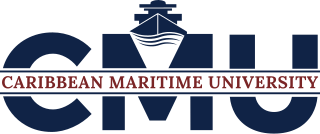
The Science, Technology and Innovation (STI) sector in Jamaica is guided by two primary institutions, the National Commission on Science and Technology (NCST) and the Scientific Research Council (SRC). Both are under the direction of the Ministry of Science, Energy, and Technology.

The University of the West Indies (UWI), originally University College of the West Indies, is a public university system established to serve the higher education needs of the residents of 18 English-speaking countries and territories in the Caribbean: Anguilla, Antigua and Barbuda, The Bahamas, Barbados, Belize, Bermuda, British Virgin Islands, Cayman Islands, Dominica, Grenada, Guyana, Jamaica, Montserrat, Saint Kitts and Nevis, Saint Lucia, Saint Vincent and the Grenadines, Trinidad and Tobago, and Turks and Caicos Islands. Each country is either a member of the Commonwealth of Nations or a British Overseas Territory.

Git is a distributed version control system that tracks changes in any set of computer files, usually used for coordinating work among programmers who are collaboratively developing source code during software development.
In software development, distributed version control is a form of version control in which the complete codebase, including its full history, is mirrored on every developer's computer. Compared to centralized version control, this enables automatic management branching and merging, speeds up most operations, improves the ability to work offline, and does not rely on a single location for backups. Git, the world's most popular version control system, is a distributed version control system.
A source-code-hosting facility is a file archive and web hosting facility for source code of software, documentation, web pages, and other works, accessible either publicly or privately. They are often used by open-source software projects and other multi-developer projects to maintain revision and version history, or version control. Many repositories provide a bug tracking system, and offer release management, mailing lists, and wiki-based project documentation. Software authors generally retain their copyright when software is posted to a code hosting facilities.
File sharing is a method of distributing electronically stored information such as computer programs and digital media. Below is a list of file sharing applications, most of them make use of peer-to-peer file sharing technologies.
In FOSS development communities, a forge is a web-based collaborative software platform for both developing and sharing computer applications.

GitHub is a developer platform that allows developers to create, store, manage and share their code. It uses Git software, providing the distributed version control of Git plus access control, bug tracking, software feature requests, task management, continuous integration, and wikis for every project. Headquartered in California, it has been a subsidiary of Microsoft since 2018.
This is a list of file synchronization software for which there are Wikipedia articles.

Kiwix is a free and open-source offline web browser created by Emmanuel Engelhart and Renaud Gaudin in 2007. It was first launched to allow offline access to Wikipedia, but has since expanded to include other projects from the Wikimedia Foundation, public domain texts from Project Gutenberg, many of the Stack Exchange sites, and many other resources. Available in more than 100 languages, Kiwix has been included in several high-profile projects, from smuggling operations in North Korea to Google Impact Challenge's recipient Bibliothèques Sans Frontières.

GitLab Inc. is an open-core company that operates GitLab, a DevOps software package that can develop, secure, and operate software. The open-source software project was created by Ukrainian developer Dmytro Zaporozhets and Dutch developer Sytse Sijbrandij. In 2018, GitLab Inc. was considered to be the first partly-Ukrainian unicorn.
GitHub has been the target of censorship from governments using methods ranging from local Internet service provider blocks, intermediary blocking using methods such as DNS hijacking and man-in-the-middle attacks, and denial-of-service attacks on GitHub's servers from countries including China, India, Iraq, Russia, and Turkey. In all of these cases, GitHub has been eventually unblocked after backlash from users and technology businesses or compliance from GitHub.
Perforce Software, Inc. is an American developer of software used for developing and running applications, including version control software, web-based repository management, developer collaboration, application lifecycle management, web application servers, debugging tools and agile planning software.

Void Linux is an independent Linux distribution that uses the X Binary Package System (XBPS) package manager, which was designed and implemented from scratch, and the runit init system. Excluding binary kernel blobs, a base install is composed entirely of free software.

The Caribbean Maritime University is a Jamaican higher education institution specialising in maritime education and training. Its primary campus is located on the Palisadoes Park, overlooking the Kingston Harbour.

The open-source-software movement is commonly cited to have a diversity problem. In some ways it reflects that of the general gender disparity in computing, but in general is assumed to be even more severe. The same can be extended to the racial and ethnic diversity of the movement. "Diversity" in this article uses the academic Critical Theory definition.
The Update Framework (TUF) is a software framework designed to protect mechanisms that automatically identify and download updates to software. TUF uses a series of roles and keys to provide a means to retain security, even when some keys or servers are compromised. It does this with a stated goal of requiring minimal changes and effort from repository administrators, software developers, and end users. In this way, it protects software repositories, which are an increasingly desirable target for hackers.
Helen Nosakhare Asemota is a biochemist and agricultural biotechnologist based in Jamaica. She is Professor of Biochemistry and Molecular Biology and Director of the Biotechnology Centre at the University of the West Indies at Mona, Jamaica. Her research develops biotechnology strategies for production and improvement of tropical tuber crops. She is notable for leading large international biotechnology collaborations, as well as for acting as an international biotechnology consultant for the United Nations (UN).
Leith Lorraine Dunn is a Jamaican sociologist, writer and academic.









